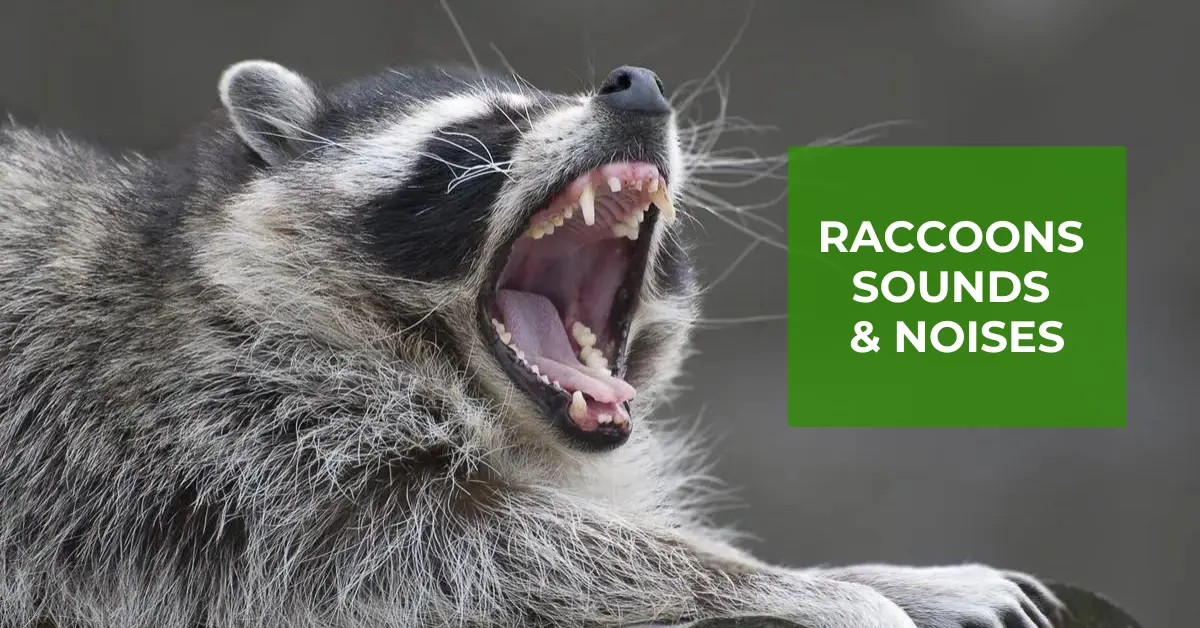What Sound Does A Raccoon Make? Raccoons Sounds & Noises

Every animal has a way of communicating with one another, some by contact, and some it is by sounds. Raccoons are known to always make so many noises, and they use these sounds to pass the necessary information to one another.
The adult and baby sounds can include a variation of about 100 noises. They are very vocal animals either as youth or a baby or even as an adult.
You may have been hearing some sounds, and curious to know what sound does a raccoon make, to be sure if they are in your home. Also, if they are not in your home knowing their noises will help you when they are already getting close to your vicinity.
Contents
- 1 What Sound Does a Raccoon Make?
- 2 Raccoon Sounds And What They Mean
- 3 What Type Of Noise Does A Raccoon Make At Night?
- 4 What Sound Does a Raccoon Make When Happy?
- 5 Raccoons Fighting Sounds
- 6 Raccoons Mating Sounds
- 7 Raccoons In The Attic Sounds
- 8 What Sound Does A Raccoon Make When Being Attacked?
- 9 Other Ways Raccoons Communicate With Themselves
- 10 What Do Baby Raccoons Sound Like?
- 11 Sounds To Scare Raccoons Away
What Sound Does a Raccoon Make?
When it comes to the type of sounds raccoons make, some of the sounds are not special or different from the ones you have heard before.
Some other animals also do make this sounds, but the uniqueness and what it means is what differentiates all the sound from each other. Raccoons are known to be vocal animals, and they can be very loud with their sounds. This is because they are high pitched vocalist.
Raccoon Sounds And What They Mean
There are different sound that are made by Raccoons and all the sound has different messages it is passing across. Though asides sounds or noises they have physical means they take to pass any information across to each other.
Raccoons always use these sounds in combination with each other, also they love to use facial and physical cues to communicate as well. Their communications do spell out how they feel and it is essential to know what these gestures mean.
Chittering
This is a sound that is produced by the mother raccoon when she is trying to talk to her baby raccoons. This chittering sound is also produced when they are nervous, scared, or feeling uncomfortable.
Chittering carries the combination of purring and clicking sounds that they make with their throats, teeth, and salivary glands.
It is believed that Chittering is used by the mother raccoon to calm down her baby raccoons when frightened or upset. A similar sound is made as a response by the baby raccoon to the mother saying they feel better.
In addition, female raccoons use this sound during mating season to let the male know they are ready to breed. Interestingly, the chittering sound is the only way for the male to find a female he can mate with.
Hissing
Raccoons also make a hissing sound, and they do this when they are scared or threatened by something close. They intelligently do this to scare off other animals like dogs, cats, or even humans.
Mother raccoons also make this sound when a male raccoon is making some dangerous advances to their babies. This will help the male to realize the mother is serious and the male will back off.
Purring
When the raccoons are looking for a defensive mechanism or they want to release a warning sound that they can be dangerous if attacked, they purr. They add some visual cues like stiff posture, and baring the teeth and claws, and raised fur.
It is common with young raccoons that are still with their mothers. The purr sound is unique, and sounds like when kittens purr. Though kits would only purr when their mother is caring for them by licking them. The adults uses purr to express satisfaction, and happiness, like when they are eating or they are with the young ones.
Screech
Whenever you hear the raccoons screech it means they are in distress or they are feeling threatened by something close by. Raccoons make this sound to express their fear and panic.
They always do this when the trouble is nearby or they are cornered. The noise can be loud, and high pitched, and you can hear their voice in your room, even if your windows are closed.
Growl
Raccoons combine growling and barking to communicate with other raccoons to show they are excited, most especially when they are chowing a big meal, or general excitement.
Also, they make this noise when they are stressed or they are threatened. If they are cornered or they feel like they are in danger, they use this vocalization to scare predators away, and ascertain they mean business. Mother raccoons also uses this sound when they can’t find their babies, when looking for them.
Bark
Raccoons also pass information and messages through barking, just like the dogs have it. They use this to express that they are excited, and also to warn other animals or intruder away from their territory.
What Type Of Noise Does A Raccoon Make At Night?
Homeowners will most of the time hear the noises of raccoons at night. This is because they are mostly active at night, they are nocturnal animals and search for food at night.
Raccoons will follow their nose to food, and that is why they are often found digging through garbage cans and dumpsters. Through the sounds they do make from this, they can wake homeowners from their sleep.
As an individual, you may hear raccoons with sounds like pest rustling or scratching between the walls. Because they are mostly active at night they tend to have the same sound as produced during the day even at night.
It is worth nothing that if you can’t catch them in the act such as knocking over your garbage can, it may be difficult to say whether they are rodents or raccoons in the attic sound.
As much as they make their dens in places where it is difficult to be noticed by pests, the sound they make always exposes them. In other words, the chittering, hissing, purring, barking, etc., are the same sound they make during the day as well as at night.
What Sound Does a Raccoon Make When Happy?
When raccoons are happy they have sounds or noises that they use to express it and most times these sounds are also used to show they want something. Sounds like purring, cooing, and whimpering are noise signals that Raccoons are happy or that they want to get something.
Raccoons Fighting Sounds
Raccoons always have sound for everything; when they fight, they make shrieking noises. Also, they make this sound when they feel threatened as well. A whimpering or a growling sound usually precedes this sound. Most times, this sound depends on how the fight is going.
Raccoons Mating Sounds
Raccoons also mate to produce new offspring, and when they do so, they make some sounds. When raccoons mate, they scream, though their screaming can also mean they are fighting. If you hear this sound around January and May, it is a sign that they are mating; there’s a possibility you will have some newborn raccoons about 63 days later.
As said before, the screaming sound for mating can also mean they are fighting, so it is difficult to differentiate between fighting and mating screams. In either case, if you hear a raccoon screaming, you should stay away since the sound can’t be differentiated.
Raccoons In The Attic Sounds
When raccoons are in the attic, they also make sounds that announce their presence. If you hear sounds of animal rustling or scurrying about the attic or the chimney can mean that raccoons are around.
Raccoons will also sound when the pests walk across the rooftops when constructing their dens or attempt to gain entry through roles or other openings that lead to attractive denning sites.
What Sound Does A Raccoon Make When Being Attacked?
When raccoons are attacked they make the growling and hissing sound to indicate they are under attack. Most animals express anger, attack, and distress by hissing or growling.
Raccoons are fairly calm and non-violent creatures when not provoked but can show some aggressive traits when they feel threatened or attacked.
Other Ways Raccoons Communicate With Themselves
Raccoons also use body language to communicate with themselves asides from using sound or noise. They create facial cues which can include ears that are forward or back, also moving eyelids, can raise their fur alongside their tail and shoulders. Also, they display wrinkled skin around their eyes or muzzle, and they also raise lips that reveal their teeth.
They lower their heads, arch its back, and attempt to look bigger than they are whenever they feel cornered or afraid, or in danger. Also, they would puff out their tail to make it look bigger.
This sign is an indication that other raccoons or human beings should not mess with them. They always accompany these physical cues with hissing or growling noises.
What Do Baby Raccoons Sound Like?
Baby raccoons do produce different types of sounds, such as chattering, mewling, and even whimpering. It is important to know that these sounds depend on their ages, circumstance, and environment.
If you hear the sound of baby raccoons close to your house, you need to respond and take necessary precautions when necessary. Some of the common sounds made by baby raccoons are:
Chittering: they make this sound when are excited and playing or even exploring. The chittering sound resembles that of small rodents or squirrels. Baby raccoon chittering is more distinct and slightly has a sharper tone.
Whimpering: they make this sound when they are scared or afraid or to indicate they are in pain. This sound always comes faint and does sound like a puppy whimpering but raccoons’ own is unique.
Mewling: this is similar to when kitten meows, and baby raccoons emit this sound when they are hungry or in discomfort. It is always a soft, and distressed sound and easy to differentiate from the meows of cats. The pitch and the tones are unique to baby raccoons.
Sounds To Scare Raccoons Away
To scare raccoons away or to repel them, sounds from wind chimes, or radios set to a conversational station that mimics human voice. Also, when you have bioacoustics sounds from other animal noises, shouting, firecrackers, and banging pots and pans. All these can scare and scare and repel raccoons away from your house.
Raccoons are vocal animals that use sounds or noises to communicate their emotions and feeling to one another. These sounds are for expressing anger, happiness, distress, attack, affection, and even a way to communicate with younger ones.
These animal use sound and noise to communicate with one another, the only difference is the uniqueness of voice and pitch. You may hear one of them make a loud voice in the attic and that is if one of them is around, and can hear sound when they are trying to find their way into your house.




